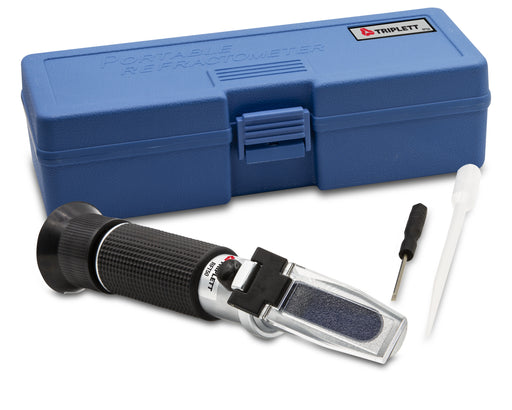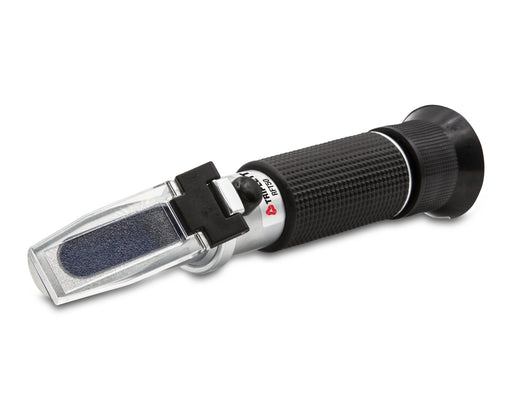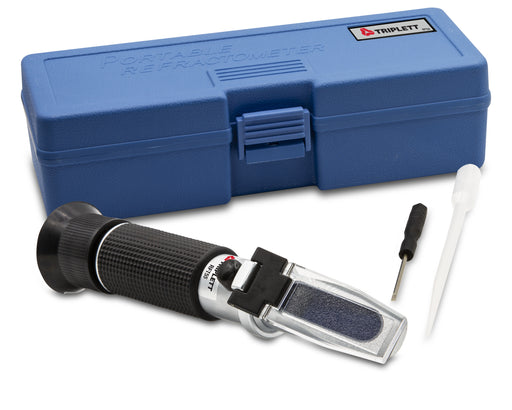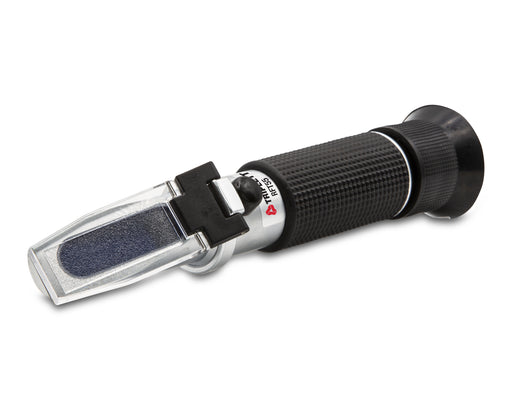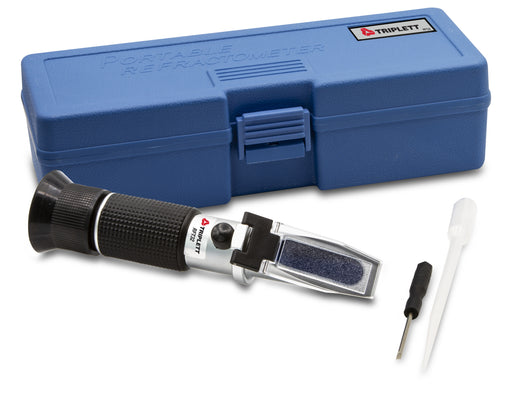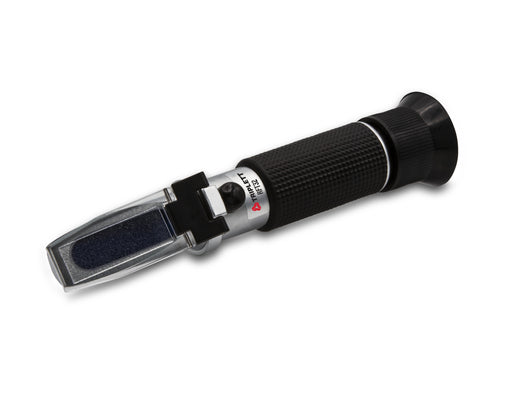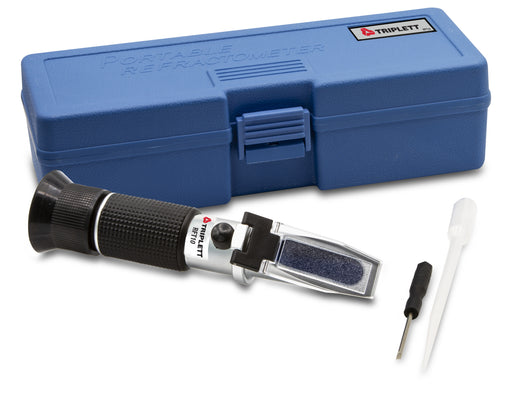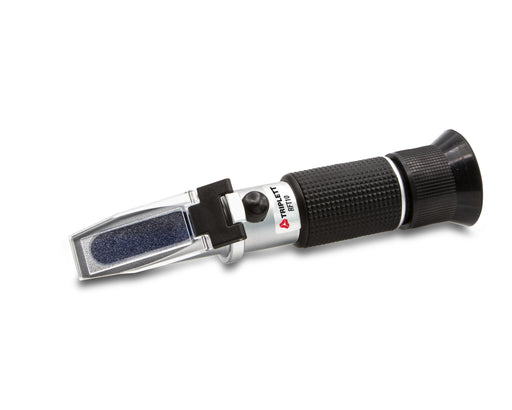Know More About Triplett Refractometers
What is the working principle of a refractometer?
A refractometer works on the principle of refraction. It is used to measure the freezing point of fluids or concentration of a substance in the solution under test. When light rays pass between mediums, they usually bend. This bending can be towards or away from the separating line between two media. The angle that forms between the incident and normal ray is known as the incidence angle. The angle between the refracted ray and the normal ray is referred to as the angle of refraction. This angle of refraction is related to the index value of the fluid under test. Each compound tested by a refractometer has a specific refractive index. The readings of the refractive index depends on the concentration of substance in the media as well as the temperature. It means, the degree of bending of light will change depending on the concentration of substance and temperature.
What are the types of refractometers offered by Triplett? What are their typical features?
We mainly provide handheld refractometers which are slightly bigger than the flashlights that you use in homes. They can be used for mobile applications and are easy to use. The following features of these refractometers have contributed to their popularity.
- The refractometers are small and can be easily carried around with its kit.
- The device requires only 2 to 3 drops of solution for accurate measurement.
- Our portable refractometers feature ATC, which automatically compensates for ambient temperature changes.
- Refractometers can be easily calibrated using distilled water.
What are different types of refractometers and how do they work?
Our selection features handheld analog refractometers, which are usually held up against the light source. The light is directed through the sample using the lenses and prism. A shadow can be observed on the measurement scale, which results from the total internal reflection of light. This can be easily viewed through the eyepiece.
- Portable Battery Coolant/Glycol Refractometer: The Portable Battery Coolant/Glycol Refractometer is designed to determine the freezing point of Propylene/Ethylene Glycol and the specific gravity of Battery Acid. With this device, just a mere 2 to 3 drops of the solution are all that's needed for precise measurements. Its Automatic Temperature Compensation (ATC) feature seamlessly adjusts for variations in ambient temperature, ranging from 50°F to 86°F (10°C to 30°C). Calibration is a breeze, requiring only the use of distilled water.
- Brix Refractometers: The Portable Sucrose Brix Refractometer is a versatile tool capable of measuring the concentration of industrial cutting fluids (ranging from 0% to 32%) as well as the sugar content in a wide range of products such as fruits, fruit juices, wine, beer, soft drinks, and various foods and beverages. It excels in precision and efficiency, demanding only 2 to 3 drops of solution for highly accurate measurements. The Automatic Temperature Compensation (ATC) function ensures reliability by automatically correcting for fluctuations in ambient temperature, spanning from 50°F to 86°F (10°C to 30°C). Furthermore, calibration is a simple task, requiring only the use of distilled water. Our selection features brix refractometers which are handheld devices.
What are the applications of refractometers?
Our portable refractometers are designed to measure the following:
- Concentration of ethylene/propylene glycol
- Battery acid specific gravity
- Sugar content of fruit juices, wine, beer, soft drinks, and various beverages
What is brix percentage?
Degree brix (°Bx) is the amount of sugar content present in an aqueous solution. One degree brix represents 1 gram sucrose in 100 grams of solution. This brix percentage indicates the solution’s strength by percentage mass. If the sucrose solution comprises dissolved solids than pure sucrose then the °Bx will indicate the approximate value of dissolved content.
How to use portable refractometers?
Our portable refractometers are designed for easy use. You can take the measurements by following the below steps.
- Calibrate the refractometer before use. A standard solution can be used for calibration. The automatic compensation feature allows the refractometer to compensate for temperature differences.
- Place 2 or 3 drops on the prism and cover the prism plate. This will help distribute the drops evenly on the prism.
- Keep the prism end of the refractometer near the light source.
- Now, check the eyepiece and focus it so the scale is visible.
- Focus on the light and dark portions and read the scale value at the point.
How to read the refractometer results?
Refractometers are designed to measure the concentration of different substances. Thus, they will give out readouts of the same. For instance, our portable battery coolant/glycol refractometers offer the freezing point readout out of propylene and ethylene glycol used in HVAC systems. These refractometers are also used to measure the efficacy of car battery fluids, which offers a readout that can be used to understand the battery’s condition. The brix refractometers offer a readout on the sucrose percentage and are widely used in the food and beverage industry for quality control.
Do these refractometers require special maintenance?
No, our refractometers do not require special maintenance. Wipe the prism clean using the lens tissue after you complete the measurements. Do not scratch the prism when the device is not in use. You can cover the prism to avoid scratching.
Browse More Building, Maintenance & Environmental Collections
Inspection & Laser Distance Meters:
| Industrial Borescope Camera | Photo & Contact Tachometers |
| Manometers | Laser Distance Meters |
Gas Meters:
| Natural Gas Detector and Pen | Formaldahyde Meters | Co & Co2 Meters |
Environmental Meters:
| Sound & Noise Level Meters | Hygro-Thermometers | Non-Contact & Contact Thermometers |
| Handheld Particle Counters | Humidity Indicators & Meters | Light Intensity Meters |
| Vane Anemometers | Digital Hygrometer |
Water Quality:
| PH and Conductivity Meters |

